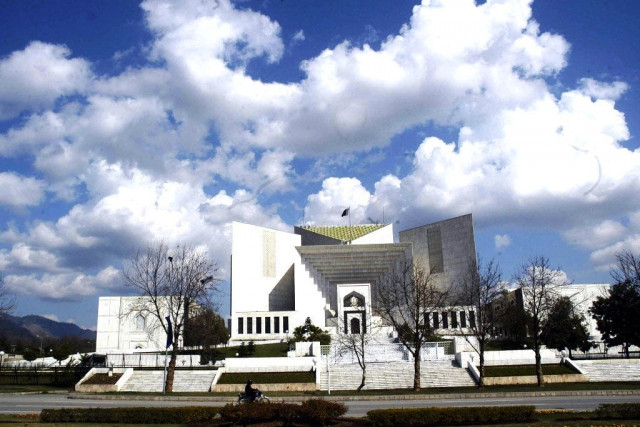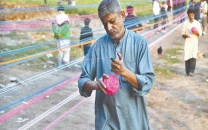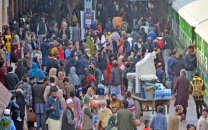Development outlay: SC hints at setting rules for funds allocation to MPs
Issues notice to Raja Ashraf for ordering distribution of Rs47b instead of Rs22b as allocated in budget.

Issues notice to Raja Ashraf for ordering distribution of Rs47b instead of Rs22b as allocated in budget. PHOTO: EXPRESS/FILE
The Supreme Court on Friday hinted at setting parameters for the prime minister to follow for the allocation of development funds to parliamentarians.
The idea of issuing guidelines was suggested by a three-member bench headed by Chief Justice Iftikhar Muhammad Chaudhry while hearing a suo motu case regarding distribution of funds by ex-premier Raja Pervaiz Ashraf in the last days of his government.
Apparently, the judges thought about laying down the criteria about use of discretionary funds in a transparent manner, after they learnt that huge funds had been distributed among people who were not even members of either the National Assembly or the Senate.
The bench issued notices to Ashraf for the distribution of development funds to the tune of Rs47 billion under People’s Works Programme-II (PWP-II), which included Rs25 billion in addition to the budgetary allocation of Rs22 billion for one year.
Furthering its earlier stay on the release of development funds under PWP-II, the court however ordered that the funds would not be lapsed.

The bench also sought the assistance of Attorney General Munir A Malik on the background of allocating development funds to the parliamentarians under the PWP-I, the criteria for its distribution, and the ultimate outcome of the investment.
Similarly the chief law officer will also apprise the court of the budgetary allocations under the PWP-II for distribution and the discretion of the prime minister over the matter.
On Friday, the court was informed that the extra Rs25 billion allocated by the government in addition to the budgetary allocations of Rs22 billion, was withdrawn from Public Sector Development Programmes. Out of the Rs25 billion, Rs15 billion had been hauled out from essential projects such as the Diamer-Bhasha Dam, Lowari Tunnel, Higher Education Commission, Larkana Sewage Programme and other projects meant for the education and the health sector, including funds saved from National Savings and for the purchase of ambulances for Khyber-Pakhtunkhwa.
Among the 69 lawmakers who were distributed development funds, former premier Syed Yousaf Raza Gilani was allocated Rs25 million, Moonis Elahi received Rs50 million and Chaudhry Shujaat Hussain, Chaudhry Pervez Elahi and Wajahat Hussain, received a total of Rs1 billion.
Similarly, Sheikh Waqas Akram received Rs30 million; the Shirazi family of Sindh received Rs100 million while Raja Pervez Ashraf received Rs2.5 billion for his own constituency.
During the proceedings, the court was told that the former prime minister had also ordered the release of Rs40 million and Rs50 million for Col (retd) Ghulam Saleem and Malik Mohammad Amir respectively, without identifying any development schemes, even though they were not parliamentarians. Ashraf also distributed Rs50 million to Faisal Majeed.
The court was shocked to learn that in many cases the names of notable individuals were not even mentioned but funds were released by the Accountant General Pakistan Revenues (AGPR). The bench also remarked that none of the secretarial staff posted with then prime minister nor any of the executing agencies had raised any objections regarding the distribution of funds.

The court asked all the officers of the relevant departments like the AGPR, Auditor General of Pakistan, Public Works Department and the finance ministry to put up their defence on the release of such funds in order to give them an opportunity of hearing.
It also asked persons who had spent the money under the PWP-II, including then parliamentarians and other notable to come forward if they desired. However, the court did not issue any notices against them as it wants to hear them before passing an order.
Published in The Express Tribune, June 29th, 2013.



















COMMENTS
Comments are moderated and generally will be posted if they are on-topic and not abusive.
For more information, please see our Comments FAQ